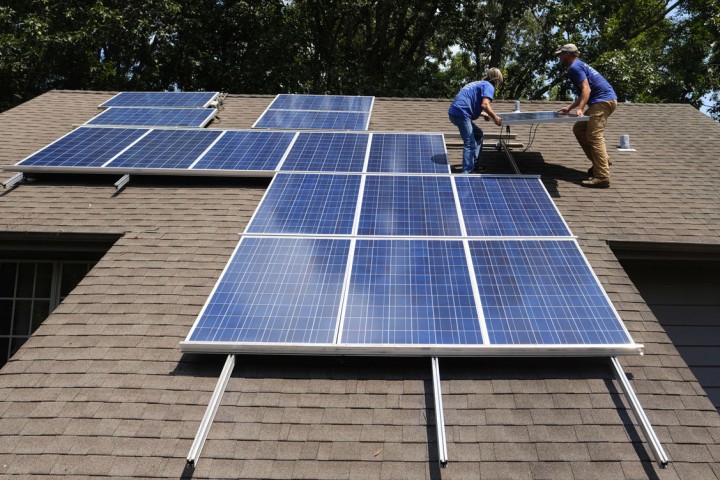Solar energy popularity

FLORENCE -- The questions Daniel Tait answers about solar energy have changed in the past two years.
Tait is no longer explaining the basic "how it works." More often now he is talking to would-be consumers about how they can use solar energy.
Tait is chief executive officer of Energy Alabama, a nonprofit advocacy group for sustainable energy. He said the shift in consumer questions indicates solar energy has a stronger foothold than it did two years ago.
The technology is familiar, and people are buying in, he said.
"North Alabama is catching on much faster (than in other areas of the state) because we are part of the TVA territory and can get more favorable conditions," he said. "There are also a lot of smart people that live in the Shoals and the Huntsville areas. In the past two years we have seen a lot more interest from folks and a lot more systems being built and put online."
Tait's group works across the state to provide education about the usability of solar energy and does advocacy work with governmental bodies to bring about changes that will make it easier to bring alternative energy sources online.
That means in part working toward agreements that streamline a resident or property owner's path to implementing an alternative energy system -- such as solar panels.
"The main hang-up in Alabama is we really have policies in place that make it difficult," Taite said. "It is almost like we have regulatory burdens that frustrate people or make it hard for people to do it.
"It takes a lot of time to jump through the hoops and fill out the forms before you even get to the point of installing a system. We need to reduce the regulatory burdens so regular folks, and small mom and pop business have a more streamlined way to make it happen."
Chris Shearburn, a co-owner of Southern Solar Systems in Huntsville, said his company has done a good amount of work outside of Alabama because the market is better in other states. Tennessee and Missouri are places Southern Solar has done work recently.
"We'd love to be able to just work in Alabama and it is growing in Alabama," Shearburn said. "However, Alabama does not have the best incentives."
Shearburn's company started in 2007.
At that time the cost of installing solar panels as an alternative to traditional power supply was prohibitive, but the price has dropped substantially in the past decade.
Shearburn said in 2007 it would be unlikely people would recoup their investment.
"Now, people can do it and the system will pay for itself in about 10 years," he said. A typical solar system has a 25-year warranty and will last years past that, Shearburn said, so a consumer will have 15 or more years of making money through energy savings of a solar system.
Nancy Muse, a member of the Shoals Environmental Alliance, had additional solar panels installed at her Florence home last week.
Her solar energy supplements traditional supplied power.
She's making the switch as she is able, she said. She is looking at introducing solar-supplied heating for water, as well.
Muse has organized local solar symposiums as informational sessions for people interested in alternative energy supplies. One of her go-to speakers is Doug Kalmer. Kalmer and his wife live in Lutts, Tennessee, in a passive solar home he built in the 1980s.
He started utilizing solar energy before that. He was in his mid-20s and living in New York and needed a way to avoid the high cost of heating his un-insulated, "run-down" house. He did that with solar space heating.
"A friend gave me a subscription to Mother Earth News and it had a lot of DIY solar ideas," Kalmer said. "That made me want to do everything I could do with the free, abundant fuel that falls on us every year."
In his current home, he does not have an electric bill. He actually gets money back from TVA each year because his solar system supplies more power than he uses.
That excess power feeds back into the power grid.
"Most people think I must have batteries and not be connected to the grid," he said. "Most people think you have to be off the grid with generators, but with the grid tie you don't have to do anything. There is no maintenance, no batteries to monitor or replace. It is very simple to use whatever you want to run and run whatever you want whenever you want."
TVA, the area's power supplier, has incorporated various forms of renewable energy into its power portfolio.
Tammy Bramlett, director of business development and renewables at TVA, said TVA is a partner in about 3,200 installations of solar power, and many of them are private rooftop installations at houses and businesses that tie into the TVA power grid.
TVA has a purchasing agreement with River Bend Solar center in western Lauderdale County to buy power from the 300,000 solar panels installed on 640 acres of farm land. It is the largest in TVA's service area, Bramlett said.
TVA also owns and operates some smaller solar centers, but the majority of TVA's solar power is generated through private, small installations.
"We see the future as being pretty bright for solar," she said. "There has been a lot of growth and a lot of interest. Prices are coming down and interest is going up."
Private installations tie into the TVA system through TVA's Green Power Providers program with municipal electricity departments.
"Solar power and TVA work hand in hand. You can have the solar option while still getting service from the utility provider," Bramlett said.
"Solar is something we support," Bramlett said. "We think the technology is good, and we are very focused on reducing carbon emissions in the Valley."
